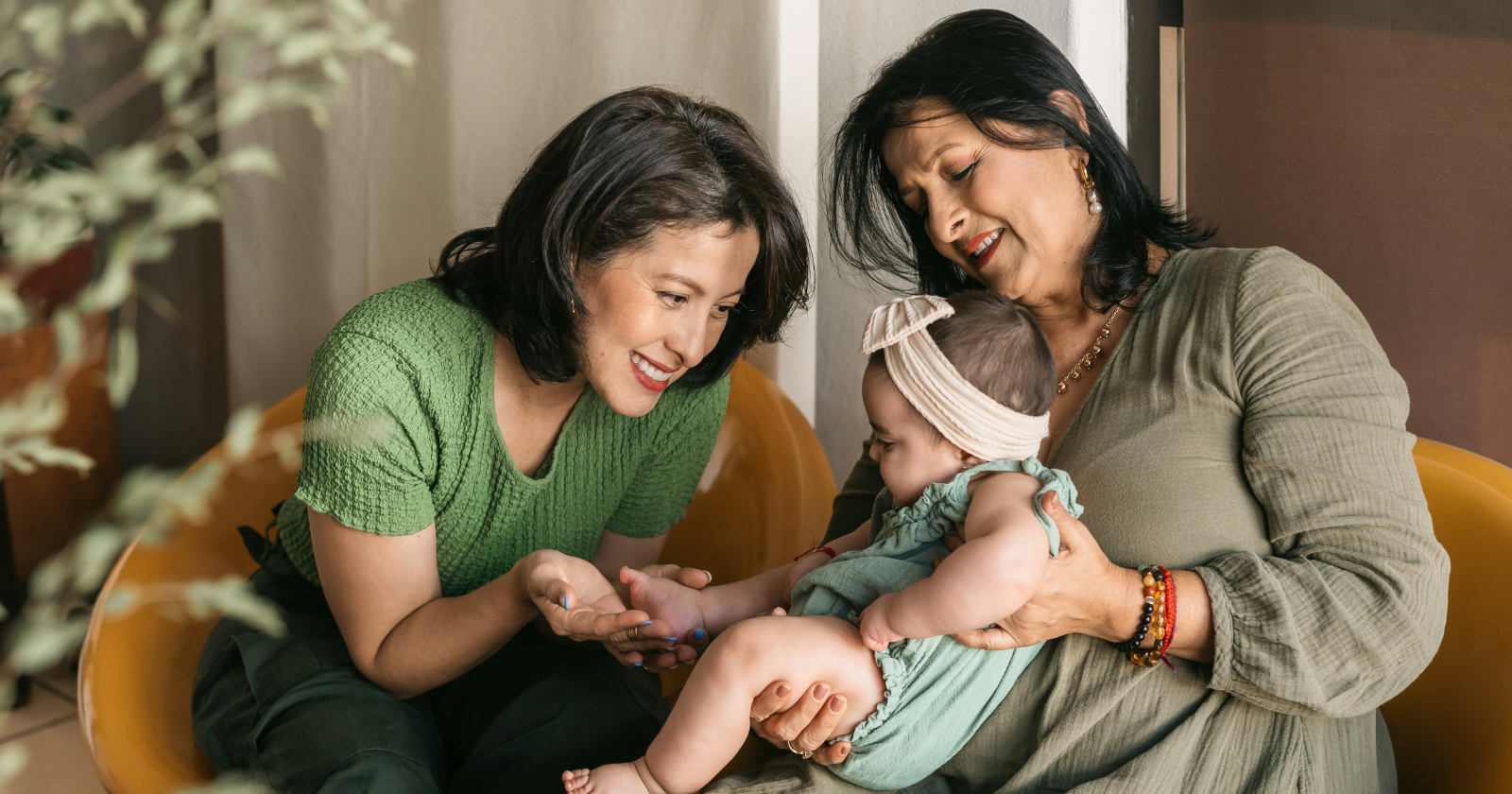My daughter Emilia is only one, but I already notice how she lights up when we video call my parents or when we’re planning our next trip to see Matias’s family in Santiago. There’s something special about the way grandparents connect with grandkids that’s hard to put into words.
Living in São Paulo while both our families are continents away has made me pay closer attention to what actually builds these bonds. My in-laws have mastered it. Even though we only see them a few times a year, Emilia runs to them the moment she spots them at the airport.
I’ve been watching what they do differently, what makes the time together feel meaningful instead of just pleasant. Here’s what I’ve noticed about grandparents who create connections that last.
1. They show up consistently, even in small ways
The strongest bonds aren’t built during big holiday gatherings. They’re built through regular, smaller moments of connection.
My mother-in-law sends Emilia voice messages almost every week. Sometimes it’s just her singing a song or telling a quick story about what she saw at the market. Emilia doesn’t always understand the words yet, but she recognizes the voice and gets excited.
Consistency matters more than grand gestures. A quick video call every Sunday does more for the relationship than an expensive gift shipped once a year. Kids remember who was there, who made the effort to stay present in their lives even from a distance.
When we visit Santiago, Emilia already feels comfortable because she’s been hearing those voices all along. There’s no awkward warm-up period. She knows these people care about her because they’ve shown it over and over.
2. They let kids be kids without constantly correcting
I’ve noticed that the grandparents Emilia gravitates toward are the ones who let her explore without hovering. They’re not constantly saying “no” or redirecting every little thing she does.
My father-in-law will sit on the floor and let her climb all over him. If she wants to play with the remote control, he hands it to her (after taking the batteries out). She gets to investigate, touch things, test boundaries in a safe way.
This doesn’t mean they’re careless. They still keep her safe. But they’re not micromanaging every moment or treating her like she’s fragile. As psychologist and parenting expert Alison Gopnik has noted, children learn best through exploration and play, not through constant instruction.
Kids can feel when adults are relaxed around them. They pick up on that energy and mirror it back. The grandparents who let children lead the play are often the ones kids want to spend more time with.
Related Stories from The Artful Parent
- Psychology says the reason couples fight more after becoming parents isn’t about the relationship getting worse — it’s about invisible labor finally becoming impossible to ignore
- I used to think being a good father meant doing extraordinary things with my kids — then I realized the pancakes from a box mix every Sunday morning were already enough
- 9 signs you were raised by a ‘good enough’ parent and it gave you exactly the resilience that perfectionist parenting accidentally prevents
3. They have their own special activities that belong just to them
Every grandparent-grandchild pair I’ve seen with a strong bond has something that’s uniquely theirs. It’s not about doing everything together. It’s about having one or two activities that feel special.
Matias’s dad takes Emilia to feed the ducks at the park near their house. Every single visit, without fail. She’s started associating him with that specific adventure. His mom bakes with her, even though Emilia mostly just makes a mess and eats the dough.
These rituals don’t need to be elaborate. One of my friends told me her daughter’s favorite memory with her grandmother is sitting on the porch shelling peas together. Another friend’s son bonds with his grandfather over washing the car every Saturday morning.
What matters is that it’s consistent and that it’s theirs. Kids love having traditions that belong to specific people in their lives.
4. They stay curious about who the child actually is
The grandparents who build lasting connections don’t just project what they want the child to be. They pay attention to who the child is becoming.
When we’re in Santiago, my mother-in-law watches how Emilia plays. She notices what holds her attention, what makes her laugh, what she returns to again and again. Then she adjusts. If Emilia loves music, she plays more songs. If she’s into books that week, they read together.
- Psychology says the reason losing a fake friend feels like grief even when you’re relieved is that your brain doesn’t mourn the person. It mourns the version of yourself that believed the friendship was real, and that identity loss is neurologically identical to heartbreak. - Global English Editing
- People who carry an air of genuine sophistication into their later years aren’t the ones who learned the most rules — they’re the ones who became secure enough that the rules became irrelevant, and the habits that remain are simply the natural expression of someone who is completely comfortable taking up exactly the amount of space they need and not one inch more - Global English Editing
- I’m 65 and the art of being happy alone took me decades to learn — these are the 8 things I do instead of chasing friendships that were never real - Global English Editing
This gets even more important as kids grow. I’ve seen grandparents lose connection with teenagers because they kept treating them like the seven-year-old they remember instead of getting to know the person right in front of them.
Ask questions. Listen to what excites them now, not what excited them three years ago. Show genuine interest in their changing world.
This idea of truly seeing someone’s nature got me thinking about my own core instincts and what drives me as a parent and person. I recently took the Wild Soul Archetype Quiz — it reveals which power animal walks with you: the Phoenix, Buffalo, Dragon, or Wolf.
Understanding my own wild soul helped me recognize patterns in how I connect and what I need to feel grounded. It’s a beautiful mirror for the season you’re in. Sometimes knowing our own nature helps us see and honor it in the people we love, including our children.
5. They respect the parents’ boundaries without making it a big deal
Here’s something I didn’t expect to matter so much: the grandparents who have the strongest relationships with their grandkids are usually the ones who respect how the parents want to raise them.
My in-laws never undermine us. If we say Emilia doesn’t eat sugar yet, they don’t sneak her candy when we’re not looking. If we say bedtime is at 8, they help with the routine instead of keeping her up late.
This might seem like it’s more about the parent-grandparent relationship, but kids pick up on tension. When there’s friction between the adults, it affects how comfortable children feel. When everyone’s on the same page, kids can relax and enjoy the time together.
Research shows that consistency across caregivers helps children feel more secure. Grandparents who support the parents’ approach, even if they’d do things differently, create a more stable environment for connection.
6. They share stories from their own lives
Emilia’s too young for this now, but I watch how Matias lights up when his dad tells stories about growing up in Chile. Those stories create a sense of history and belonging that you can’t get anywhere else.
Grandparents who share their memories give kids a window into a different time. They help children understand where they come from and what shaped the family. It’s not about lecturing or living in the past. It’s about passing down context.
My own grandmother used to tell me stories about her childhood in Central Asia. She’d describe the foods she ate, the games she played, the way her own mother taught her to cook. Those stories stuck with me. They made me feel connected to something bigger than just my immediate family.
Kids ask questions when they hear these stories. They want to know more. That curiosity strengthens the bond because it creates real conversations, not just small talk.
7. They make the child feel like spending time together is a joy, not an obligation
The grandparents with the strongest bonds never make kids feel like they’re a burden or an interruption. They genuinely seem happy to be together.
When we arrive in Santiago, my in-laws greet us with so much warmth that Emilia feels it. They don’t complain about how tiring kids are or how much work it is to have us visit. They make it clear that having us there brings them joy.
This attitude makes a huge difference. Kids internalize how the adults around them feel. If grandparents treat time together as a chore, children sense that and pull back. If grandparents make it feel like a privilege to spend time together, kids lean in.
Final thoughts
Building a strong relationship with grandchildren isn’t about being perfect or having unlimited time. It’s about being intentional with the time you do have.
Show up regularly, even in small ways. Let kids explore and be themselves. Create special traditions that belong just to you. Stay curious about who they’re becoming as they grow. Respect the parents’ approach without undermining it. Share your own stories and history. Most importantly, make spending time together feel like a gift, not a duty.
The grandparents who do these things are the ones kids call just to chat when they’re older. They’re the ones teenagers actually want to visit. They’re the ones who stay central in their grandchildren’s lives long after childhood ends.
Distance doesn’t weaken these bonds when the foundation is strong. Emilia might not see her grandparents every week, but she knows they love her. She feels it in their consistency, their attention, their joy. That’s what creates connections that last.



